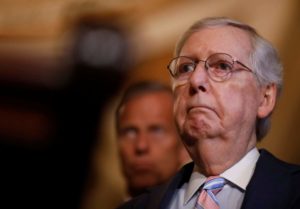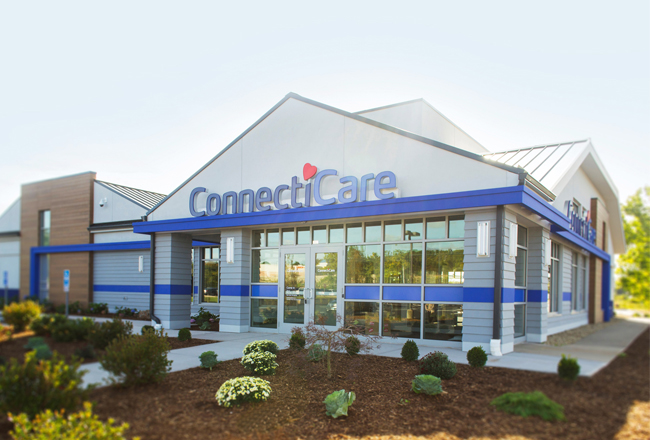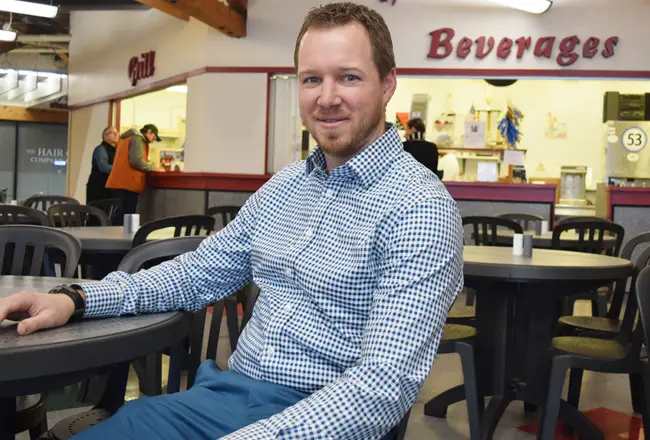Gov. Ned Lamont announced that 415 Connecticut residents have tested positive for COVID-19, and that 10 people have now died from the virus. Some 4,500 tests have been completed, he said.
A county-by-county breakdown includes:
| County | Laboratory Confirmed Cases | Hospitalized Cases | Deaths |
| Fairfield County | 270 | 20 | 6 |
| Hartford County | 61 | 13 | 2 |
| Litchfield County | 13 | 2 | 0 |
| Middlesex County | 8 | 4 | 0 |
| New Haven County | 41 | 12 | 0 |
| New London County | 4 | 1 | 0 |
| Tolland County | 16 | 2 | 2 |
| Windham County | 2 | 0 | 0 |
| Total | 415 | 54 | 10 |
 The governor said the state is expecting the number of people infected in Connecticut to double every three to four days. Dr. Matthew Cartter, the state epidemiologist with the Department of Public Health, said the number of infections would thus be “in the thousands range,” referring back to his comments a few days ago that there could be 3,000 to 6,000.
The governor said the state is expecting the number of people infected in Connecticut to double every three to four days. Dr. Matthew Cartter, the state epidemiologist with the Department of Public Health, said the number of infections would thus be “in the thousands range,” referring back to his comments a few days ago that there could be 3,000 to 6,000.
Cartter estimated that the number of deaths will be “much greater” than the approximately 300-600 recorded each flu season.
Lamont said that current estimates are that 15% of the infected will end up in the hospital, and of those, “maybe 5% will end up in intensive care.”
The governor said that “one bit of good news” is that the average ICU time seems to be about two weeks, versus the four-week average in China. No data on how many patients have recovered is yet available.
State hospitals have increased their capacity by 30% to 40%, he said, largely due to the cancellation of elective surgeries, which he noted can be significant revenue streams for those facilities. Lamont said he hopes to get that figure up to 50%, “and we’re getting there.”
He further expects to tap state nursing homes and college dorms that have been vacated as sites for intermediate care should the hospitals become overwhelmed.
Lamont also said that while the federal government is focusing on New York City as one of the nation’s hotspots, they “should not prioritize one state over the other,” and that New York City, Westchester County and Fairfield County should be considered a single hotspot.
Not willing to embrace the criticism some other governors have leveled at the federal government for its slow response to the crisis, Lamont had some positive remarks about the Federal Emergency Management Agency ”“ “I’d like to think they’re going to put a little more energy” into the federal response ”“ and said that the states will work together to source personal protective equipment should the feds fail to deliver soon.
SCHOOLS PUSHED TO APRIL
Initially scheduled to reopen on March 31, Connecticut’s public schools will instead remain closed through at least April 19, the governor announced.
However, “I do not want to lose a semester,” he said, repeating calls for teachers and other educators to step up their tele-learning and phone calls to students.
As classes remain cancelled in schools throughout the state and schools are making every effort to promote remote learning, The Partnership for Connecticut today announced that it will be donating 60,551 laptops to students attending high school in some of the state”™s most under-resourced school districts. Eligibility is limited to the high schools across the state”™s 33 Alliance Districts that serve significant populations of students who are eligible for free or reduced-price meals, and laptop distribution will prioritize students demonstrating the most need; those districts include Bridgeport.
The Partnership for Connecticut is a nonprofit organization dedicated to helping Connecticut”™s disengaged and disconnected youth and young adults access the educational and career opportunities they need to succeed in life.
For more information, read the announcement made today by the nonprofit.
Verizon, AT&T, Altice, Frontier and others have pledged to offer free wi-fi in hot spots to students, whether they are subscribers or not, and will lift their data caps to help provide consistency and reliability in learning.
LAMONT’S LATEST EXECUTIVE ORDER
Lamont”™s Executive Order No. 7K enacts the following provisions:
- Suspension of non-critical probate court operations and associated requirements: Suspends, for the duration of the public health and civil preparedness emergency, all statutory reporting and filing requirements of the Office of the Probate Court Administrator concerning probate court operations; probate court facility, location, or venue requirements; time requirements, statutes of limitation or other limitations or deadlines relating to service of process, court proceedings, or court filings; and all time requirements or deadlines related to the probate courts or their judicial officials to issue notices, hold court, hear matters, and/or render decisions.
- Suspension of non-critical Workers”™ Compensation Commission operations and associated requirements: Suspends, for the duration of the public health and civic preparedness emergency, all location or venue requirements; time requirements, statutes of limitation, or other limitations or deadlines; and all time requirements or deadlines of the Workers”™ Compensation Commission relating to the Workers”™ Compensation Act and other statutory programs and schedules over which the commission provides adjudication, dispute resolution, administrative oversight or support.
- Authorization of remote notarization: Modifies state laws and regulations to permit any notarial act that is required under Connecticut law to be performed using an electronic device or process that allows a notary public and a remotely located individual to communicate with each other under certain conditions, including recording and live presentation of identification.
- Suspension or modification of regulatory requirements to protect public health and safety: Permits the commissioner of Public Health to temporarily waive, modify, or suspend regulatory requirements adopted by the agency or related boards or commissions deemed necessary to reduce the spread of COVID-19 and to protect the public health.
- Suspension of certain requirements regarding the temporary hire of care workers at long-term care facilities: Allows long-term care facilities to temporarily hire care workers to address the critical need in these facilities without background checks of state and national criminal history records, expanding the availability of an existing statutory waiver process.
Drive-through testing added to five more hospitals
Drive-through testing sites have been added at Griffin Hospital (Derby), Norwalk Hospital, Rockville General Hospital (Vernon), UConn John Dempsey Hospital (Farmington), and William H. Backus Hospital (Norwich), bringing the total number of these alternate testing sites to 21.
The latest list of drive-through testing locations includes:
- Bridgeport Hospital
- Bristol Health
- Charlotte Hungerford Hospital (Torrington)
- Danbury Hospital
- Greenwich Hospital
- Griffin Hospital (Derby)
- Hartford Hospital
- Johnson Memorial Hospital (Stafford Springs)
- Lawrence Memorial Hospital (New London)
- Manchester Memorial Hospital
- Mid-State Medical Center (Meriden)
- Norwalk Hospital
- Rockville General Hospital (Vernon)
- Saint Francis Hospital (Hartford)
- Saint Mary”™s Hospital (Waterbury)
- Saint Vincent Hospital (Bridgeport)
- Stamford Hospital
- UConn John Dempsey Hospital (Farmington)
- Waterbury Hospital
- William H. Backus Hospital (Norwich)
- Yale-New Haven Hospital
The government asks that no one should arrive at any of the locations and ask to be tested. Anyone experiencing symptoms must consult with their medical provider first, and then they will be referred for testing and can make an appointment at one of these facilities.
Department of Public Health Commissioner signs order easing rules for out-of-state practitioners to provide services in Connecticut
Based on concerns relative to COVID-19, Department of Public Health Commissioner Ren̩e D. Coleman-Mitchell has signed an order permitting the temporary suspension of the requirements for licensure, registration, or certification in a number of medical professions for those who have the appropriate credentials in another state. This will allow Connecticut to accept support from neighboring states and will continue the stateӪs collaborative, regional approach to combating COVID-19.
Until further executive action is taken, some practitioners are not able to prescribe controlled substances. This is currently being worked on by the administration.
State receives first shipments of PPE donations, including N95 respirators
As part of Governor Lamont”™s request for the donation of Personal Protective Equipment that can be used by the state”™s medical community, the state today received its first delivery of equipment. Gil”™s Drywall of Plainville and PW Power Systems of Glastonbury both donated N95 respirators that were dropped off today at the state”™s collection facility in Cheshire.
Members of the public, businesses, and philanthropic organizations that are able to donate these vital materials are urged to contact the state by filling out the online form located at www.211ct.org/DonationsCOVID19.
Since the launching the request late last week, the state has received responses from more than 500 entities expressing interest in offering donations.
Connecticut businesses urged to note that the IRS is providing a full and immediate reimbursement for COVID-19 employee medical leave costs
Connecticut Insurance Department (CID) Commissioner Andrew Mais would like small and medium-sized businesses in the state to be aware of recent IRS guidance on novel coronavirus COVID-19-related employee medical leave and new payroll tax credits. The cost of not just the leave but also of health insurance during the leave will be covered.
The U.S. Treasury Department, Internal Revenue Service (IRS), and the U.S. Department of Labor announced in IR-2020-57 that small and midsize employers can begin taking advantage of two new refundable payroll tax credits, designed to immediately and fully reimburse them, dollar-for-dollar, for the cost of providing coronavirus-related leave to their employees. This relief to employees and small and midsize businesses is provided under the Families First Coronavirus Response Act (Act). For COVID-19 related reasons, employees receive up to 80 hours of paid sick leave.
D.C. DEVELOPMENTS
In Washington, D.C., negotiations over a $2 trillion economic stimulus package continued, as a procedural vote to move the proposal forward failed for a second time.
The vote was 49-46 against, mostly along party lines.
A key area of disagreement appears to still be the approximately $500 billion in funds for loans and loan guarantees for distressed companies, states and localities, which Republican Senators prefer. Their Democratic colleagues prefer to avoid bailing out companies without also providing that most of the benefits go to those companies”™ employees.
“Once we have an agreement that everyone can get behind, we’re prepared to speed up the consideration of that agreement on the floor,” Senate Minority Leader Chuck Schumer (D-New York) said.

“The markets are tanking once again because this body can’t get its act together,” said Senate Majority Leader Mitch McConnell (R-Kentucky). “This has to stop. The country is out of time.”
House Democrats are also in the process of devising their own third coronavirus response legislation.
Democratic presidential candidate Joe Biden also criticized the bill in a speech from his Wilmington, Delaware home. Referring to the $500 billion proviso as a “slush fund” for corporations, Biden added, “A no-strings corporate bailout makes no sense.”
He further announced that he had sent Republicans a letter asking them to withdraw their lawsuit challenging the constitutionality of the Affordable Care Act in order to alleviate uncertainty about many Americans”™ health care coverage.
In his own remarks this afternoon, Lamont said, “All the governors are united on one thing ”“ give the governors a block grant. We will focus more on hospitals and not on cruise line bailouts.”
Earlier today, U.S. Sen. Chris Murphy of Connecticut announced he is co-sponsoring a bill that would federalize the manufacture and distribution of in-demand medical supplies to address what a statement described as “the growing inefficiencies of 50 states and thousands of hospitals competing against each other for medical supplies.”
TRUMP MAY LIFT SOCIAL DISTANCING MEASURES
President Donald Trump, a frequent target of criticism over his slow response to the crisis, tweeted overnight that he might remove social distancing guidelines intended to slow the spread of the virus, in favor of aiding the economy.
“WE CANNOT LET THE CURE BE WORSE THAN THE PROBLEM ITSELF,” he tweeted. “AT THE END OF THE 15 DAY PERIOD, WE WILL MAKE A DECISION AS TO WHICH WAY WE WANT TO GO!”
Even so, a number of states ”“ including Connecticut, New York, California and Illinois ”“ have imposed stricter social distancing requirements over the past few days. Even if Trump should relax the federal guidelines, that would not override the governors”™ orders.





















